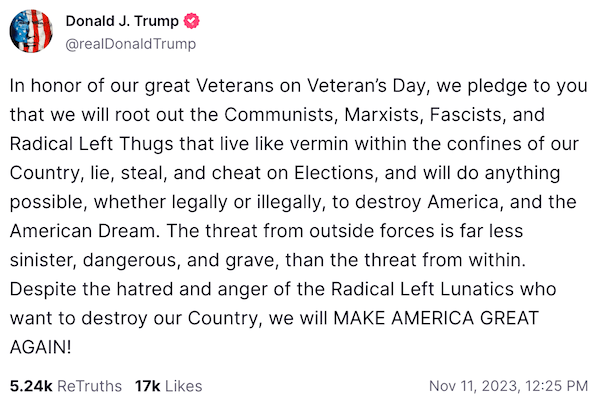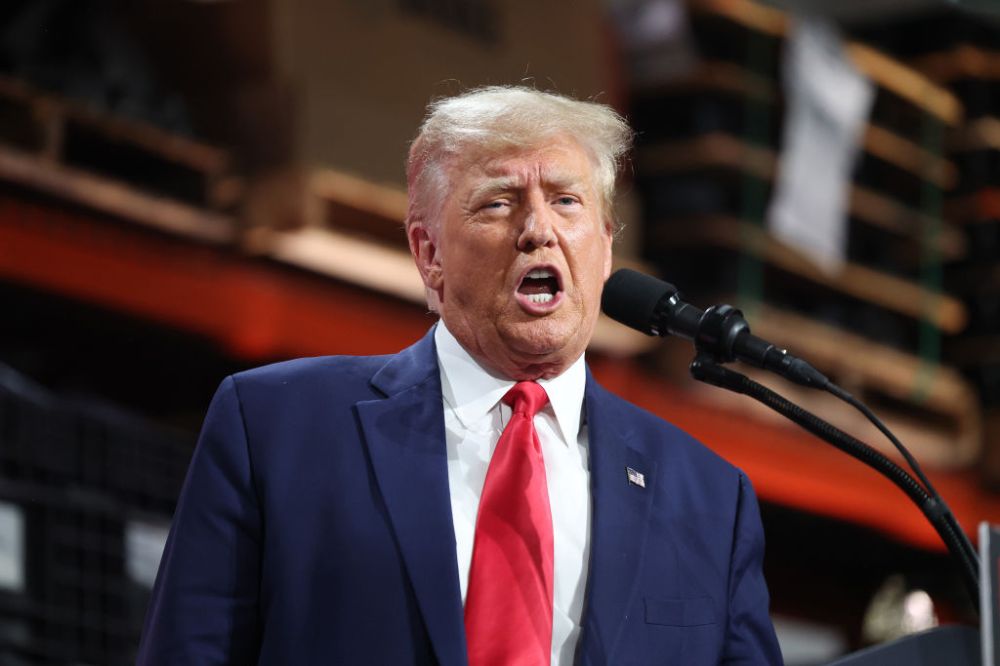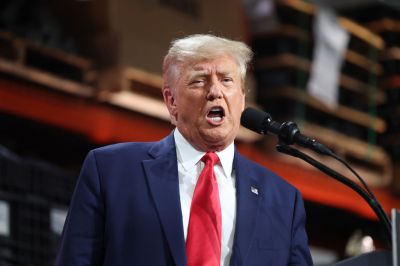Six months ago, in honor of the senator’s entry into the Republican primary, I wrote a newsletter titled “How Tim Scott Wins.”
It wasn’t as embarrassing as it sounds. The subhead was “He doesn’t. Unless …”
The “unless” part had to do with the fact that Scott was well-funded and positioned to leverage the GOP electorate’s recurring interest in black candidates. Herman Cain and Ben Carson each led briefly in the polls in 2012 and 2016, respectively, and Scott was far more accomplished politically than either. His famous likability would wear well on the campaign trail, too.
If any challenger was set to have a “moment” in the race at Trump’s expense, the senator looked to be it. “It’s easy to imagine Scott creeping up in the polls on the strength of aggressive ad spending,” I wrote, “then capitalizing on the first primary debate to launch himself into contention.”
It was the other South Carolinian, Nikki Haley, who transformed strong debates into a modest polling surge. As of this weekend, Scott sat at a feeble 2.5 percent in the national average and had no prospect of clawing back conservative voters from the rising Haley. On Sunday night, he surrendered to reality and suspended his campaign.
He underperformed, but he was always a longshot and May’s newsletter recognized it. Re-reading it this morning, this line stood out: “Trump has built a base of fanatic messianic support on the right preaching that America is terrible and only he can save it. Scott, essentially, is arguing that America is wonderful and his ascension to the Senate in the first state to secede from the Union before the Civil War proves it.”
That was true and remained true throughout the campaign, making Tim Scott a weird match for his party at this moment. His frequently touted “sunny optimism” is overstated—the “shining city on the hill” message came with dark caveats—but he’s a throwback insofar as he seems to believe that the cure for what ails the country lies chiefly outside of government. Less economic regulation and more religious faith: That’s the Scott philosophy.
That message might have won him the nomination in 2008 or 2012. In 2024, it mainly served to communicate that the senator, to borrow the post-liberal lingo of the hour, doesn’t “know what time it is.”
Let’s talk about vermin.
The day before Tim “Mr. Sunshine” Scott dropped out of the primary, the runaway frontrunner in the race commemorated Veterans Day as one does, by promising to “root out” the subhumans who are weakening his country from within.

“The threat from outside forces is far less sinister, dangerous, and grave, than the threat from within” is as succinct a summary of populist demagoguery as a human being can formulate. Along with the reference to “vermin,” it’s the “sort of language that has historically resulted in mass graves,” journalist Radley Balko wrote, correctly.
A few hours after posting it, Trump nonchalantly attended a UFC event with Kid Rock and Tucker Carlson in tow (again, as one does) and received a hero’s welcome.
Later the Washington Post asked his spokesman whether the statement didn’t sound a bit, well, Mussolini-ish. An indignant Steven Cheung called the question “ridiculous” and accused Trump-hating reporters of grasping at straws because, and I quote, “their entire existence will be crushed when President Trump returns to the White House.”
The problem of how seriously to take Trump has bedeviled his critics from the beginning of his political career, but in 2023 it has a new dimension. Judging by his own rhetoric, Trump’s become the most overtly fascist major-party candidate in American history, yet he’s trouncing respectable opponents like Tim Scott in the Republican primary and would likely defeat Biden if the election were held today. How can that be? Do American voters agree with the right about “what time it is”? (You wouldn’t know it from last week’s election result.) Or have they not realized yet what they’re getting themselves into?
Perhaps doomsayers like me are taking the “vermin” statement too seriously.
Trump is, after all, a buffoon and a notorious blowhard. His first term was spent chatting up all sorts of audacious plans that never took off, whether because he lost his nerve or was talked out of them by cooler heads. At various times he allegedly weighed withdrawing from NATO and from Afghanistan, firing Robert Mueller, shooting illegal immigrants in the legs as they approached the border, and installing Jeffrey Clark as attorney general to carry out his coup plot. None of it happened. Even the wall turned out to be mostly hype.
He also might not have any idea of the political provenance of the term “vermin.” Philip Bump remembers that Trump’s first ex-wife accused him of keeping a book of Hitler’s collected speeches by his bed, but ex-spouses say lots of things that aren’t true. I lean toward Jay Nordlinger’s view that his choice of phrase is probably more a coincidence—of sorts—than a deliberate reference to fascism’s glory days. Trump isn’t an ideologue so much as he is a personality type, and that personality type will invariably intuit its way to viewing enemies as “vermin” and “human scum.”
It’s not a personality type anyone should want in charge of a military, but I don’t think he’s making any sly historical references. A candidate willing to moderate on matters like abortion and entitlements for the sake of electability wouldn’t knowingly roll out Joseph Goebbels’ greatest hits in other subjects, would he?
It’s natural for those of us who fear we know “what time it is” to stare at the clock and rationalize why it can’t be accurate. (Or to scapegoat the media for not telling the time more accurately.) Trump doesn’t mean what he says! Even if he means it, he won’t try to act on it. Even if he tries to act on it, he’s too incompetent to pull it off. And even if he’s competent enough to pull it off, the courts will stop him.
A few weeks ago my colleague Sarah Isgur wondered on The Dispatch Podcast whether Trump staffing the Justice Department with authoritarian cronies won’t turn his second term into an elaborate, endless exercise in excuse-making. His inept post-liberal lawyers will draft all manner of dubious unlawful orders and get slapped down by one originalist judge after another, leaving the White House to whine impotently that they can’t get anything done because the courts won’t let them. They’ll be paralyzed legally by their own unconstitutional ambitions.
If that’s what happens, I’ll have been wrong in thinking that I know “what time it is.” Team Trump dutifully obeying judicial rulings amid lots of grumbling would be a better outcome than I expect.
I don’t think I’m wrong, though.
There’s no way to know what the average Republican voter does and doesn’t know about the specifics of Trump’s more recent fascist ambitions. Presumably not much given the general disinterest about the primary.
But he’s doing his best to educate them.
On Monday The Atlantic’s David Graham published a long list of Trump’s most illiberal comments from the past few months. I’d already forgotten some of them; there are simply too many day-by-day to keep them all in mind. What’s remarkable isn’t just the volume, though, it’s how transparent Trump’s been in the thick of a contested primary about his plans to turn the power of government against his enemies.
That makes it easier to rationalize away the things he says as blowhard-ery, ironically. An average person engaged in something shameful will cover it up or dissemble about it. The fact that Trump speaks publicly with bravado about his malevolent designs has the effect of conditioning his audience into believing he must not mean it—or that there mustn’t be anything shameful about what he wants to do. If there were, he wouldn’t admit to it.
It’s always been a perverse strength of his that he schemes in plain sight. The fact that the coup plot of 2021 played out on social media, tweet by tweet, surely made it harder for some to recognize it as a coup plot and easier to see it as an earnest attempt to unrig a stolen election. The fact that he insists openly, even now, that he has a right to the classified documents he took with him to Mar-a-Lago surely leads many to think there must be something to his argument. He wouldn’t be so brazenly defiant if he knew he had done wrong.
His transparency about his plans normalizes and minimizes them. We frogs boil slowly.
He’s been transparent in another way. As Dan Drezner notes, many of the news stories bubbling up lately about Team Trump’s hair-raising goals for a second term are quoting sources on the record, by name. Those sources mean business and they want voters to know that they mean business, enough so that they’re effectively signing their names to the project they’ve undertaken.
A New York Times story published on Saturday described their hope of building “huge camps” to house millions of illegal immigrants whom they intend to round up in a massive national crackdown. Trump’s top immigration adviser, Stephen Miller, gave an interview to the paper for the piece. A new Axios report describes a huge vetting effort to ensure that staffers in the next Trump government are “loyalists willing to stretch traditional boundaries” of government when their leader gives the order to do so. Heritage Foundation President Kevin Roberts is quoted in that one.
This is the essential difference between Trump 2016 and Trump 2024. His operation today is an actual political project staffed with post-liberal ideologues to a degree it simply wasn’t before.
Seven years ago, Trump was more of a celebrity phenomenon than an ideological one. He had his nationalist priorities—tariffs, NATO skepticism, and of course the wall—but he benefited enormously simply from being the “not Hillary” candidate on the ballot. He was still enough of a normie Republican to sign a massive tax cut into law in 2017 and bring figures like Larry Kudlow and John Bolton into his administration. His post-liberal brain trust didn’t extend much further than Steve Bannon and Miller.
He and everyone around him have been radicalized since then. Much of the radicalizing they did themselves, like when they concocted a dolchstosslegende about the “rigged election” of 2020 and then let the propaganda feedback loop in which they exist brainwash them into believing it. They were radicalized further by the drumbeat of indictments against Trump this year, which probably cinched the Republican primary for him. Both episodes taught them that personnel is power: He didn’t have the right people in place inside the government to carry out his coup or to obstruct the attempts to prosecute him and now he’s in all sorts of trouble.
In a second term, his plans will focus heavily on correcting that mistake—even on the federal bench, perhaps, to the extent he’s capable of making that happen. Total unaccountability requires the cooperation of the bureaucracy. Personnel is everything.
And because it is, that means many more people than Trump himself are now invested in carrying out his plans. Trump himself may be lazy, easily distracted, and persuadable by rational actors, but he’s building an organization of fascist apparatchiks that will make sure those who surround him in a second term will encourage his worst impulses instead of thwarting them.
All of those apparatchiks “know what time it is.” They’re being selected based on their ability to tell the proverbial time. Listen to Bannon.
You don’t need to take Trump seriously or literally if it makes you feel better not to do so, but take Bannon seriously. And Miller. And Kevin Roberts, and Jeffrey Clark. There are many, many stakeholders in the post-liberal project; Trump is their vehicle, and they intend to put him to good use.
So often we’re told with respect to Joe Biden that we’re not voting for a man, we’re voting for a retinue of more radical advisers who are pulling the strings in his name. With Trump, increasingly it seems we’ll end up with the same thing.
There are two ironies to the state of the race. One is that Trump’s most devout supporters and most devout critics have reached a consensus on “what time it is.”
The other is that Donald J. Trump, fascist avatar, is well positioned at the moment to be … the “normalcy candidate” in next year’s race.
I suspect that swing voters who momentarily prefer him to Joe Biden do so because they believe a Trump presidency will transport them back to 2019, not unlike the way many who preferred Biden to Trump in 2020 believed a Biden presidency would transport them back to 2015. If you don’t follow politics closely, your memories of Trump’s first term might consist of little more than “great economy, no wars, could do without the tweets.”
If he wins the election, it’ll be because voters preferred “Trump normalcy” to “Biden normalcy.” Only afterward will they find out the hard way that there’s no “Trump normalcy” to return to.
Consider what the first few months following the next election might look like if Trump wins. The GOP’s imminent plans to smash or hollow out various institutions would dominate news coverage; Trump would float dubious figures for key cabinet positions, then appoint them as “acting” secretaries if the Senate refused to confirm them. His first executive orders would be aggressive, to set a tone; they’d be challenged in court and Trump would lose on one or more, triggering a constitutional crisis if he opted to defy the ruling.
Massive protests would greet him. Mark Esper, his former defense secretary, was asked recently whether Trump might respond by invoking the Insurrection Act and mobilizing the military. He sketched this scenario:
I think if something like that were to happen right after an inauguration in January 2025, I guess, look, there would not be a civilian chain of command in place at that point in time, first of all, to push back. So there would probably be an acting secretary, he or she would then have to decide whether or not to implement that order. Otherwise, the military chain of command would be intact. Now look, there’s another option too. Most often, people go to the active duty, but there’s nothing that prevents the president from asking a governor, a friendly governor, to mobilize his national guard to assist as well.
What American troops would do once they’re ordered to suppress a protest is anyone’s guess. I suppose it depends on whether they know “what time it is.”
That’s what voters should expect, but certainly aren’t expecting at the moment, from the so-called “normalcy candidate” in the race.
Wherever it goes, I assume most Republican voters will go along with it. Whether or not they know that Trump has taken to describing his enemies as “vermin,” they’ve been conditioned over seven years to treat his whims on policy as acceptable right-wing dogma and to disregard any moral or civic critique of him as proof of liberal sympathies. (Which is why neither Ron DeSantis nor Nikki Haley will make an issue of his fitness for office, of course.) If Trump and his brownshirt advisers want to get rough with the “vermin,” forcing the right to take sides, there’s no doubt which side most will take.
Until then, it should be the collective task of those of us who “know what time it is” to make sure the electorate understands that it’s far later than they might think. We can’t stop anyone from supporting Trump, but we can make sure they do it with their eyes open. When this is over, don’t let anyone claim they didn’t know what they were voting for.







Please note that we at The Dispatch hold ourselves, our work, and our commenters to a higher standard than other places on the internet. We welcome comments that foster genuine debate or discussion—including comments critical of us or our work—but responses that include ad hominem attacks on fellow Dispatch members or are intended to stoke fear and anger may be moderated.
With your membership, you only have the ability to comment on The Morning Dispatch articles. Consider upgrading to join the conversation everywhere.